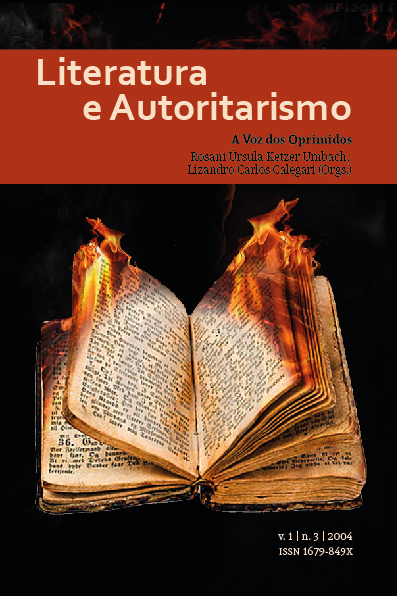Literary text and social context: the crossing of borders, in the work A rosa do povo, by Carlos Drummond de Andrade
DOI:
https://doi.org/10.5902/1679849X74213Keywords:
Carlos Drummond de Andrade, Social context, Literature, A rosa do povoAbstract
This work aims to demonstrate the social function of a literary text, as well as of its writer, trying to highlight the importance of the relationship between poetic form and social structure. Within the scope of this reflection, we defined as the object of study the poems José and Elegia 1938, by Carlos Drummond de Andrade, both from the work A Rosa do Povo, published in 1945. We seek to present a proposal for the analysis and interpretation of the texts, in order to to demonstrate Drummond's political awareness amid the impact of the violent and oppressive experience of the Estado Novo in the Brazilian context and the Second War in the world context.
Downloads
References
ANDRADE, Carlos Drummond de. José/ Novos Poemas/ Fazendeiro do ar. Rio de Janeiro: Record, 1993.
BOSI, Alfredo. História concisa da literatura brasileira. 36. ed. São Paulo: Cultrix, 1994.
CHAVES, Flávio Loureiro. História e Literatura. 3. ed. amp. Porto Alegre: Ed. Universidade/ UFRGS, 1999.
IGLESIAS, Francisco. Drummond: história, política e mineiridade. O Estado de São Paulo. São Paulo. 27 out. 1990.
LUKÁCS, Georg. Ensaios sobre literatura. Rio de Janeiro: Civilização Brasiliense, 1968.
Downloads
Published
Versions
- 2004-01-01 (2)
- 2004-01-01 (1)
How to Cite
Issue
Section
License
DECLARAÇÃO DE ORIGINALIDADE E EXCLUSIVIDADE E CESSÃO DE DIREITOS AUTORAIS
Declaro que o presente artigo é original e não foi submetido à publicação em qualquer outro periódico nacional ou internacional, quer seja em parte ou na íntegra. Declaro, ainda, que após publicado pela Literatura e Autoritarismo, ele jamais será submetido a outro periódico. Também tenho ciência que a submissão dos originais à Literatura e Autoritarismo implica transferência dos direitos autorais da publicação digital. A não observância desse compromisso submeterá o infrator a sanções e penas previstas na Lei de Proteção de Direitos Autorais (nº 9610, de 19/02/98).






